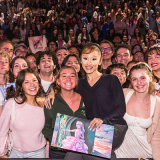Cinematography Shines at Dodge
February 3, 2016
“Visual Storytelling” is a phrase that comes around quite often throughout a student’s academic career. The “visual” aspect is created mainly from the cinematographers’ knowledge of the interaction between images and technology.
“The cinematographer is an artist (a creator of images), a manager (of people and facilities), and a technician (with deep knowledge of the underlying technology of the medium),” says Bill Dill, cinematography professor at Dodge College.
More so than reading a book, which Dill describes as a “fundamentally mechanical process,” cinematographers must use images as their vocabulary. They must make decisions, both consciously and subconsciously, regarding lighting, blocking, composition, focus, internal camera adjustments, props, and camera operating. One of the challenges of making a good movie lies in how naturally all of these aspects can come together to create a narrative. If something does not look visually appealing, then the movie suffers from it.
The cinematography program is heavily supported by the professional mentors that provide constant guidance and advice to students. The industry experience that all of the cinematography professors have is incredibly helpful when it comes to students making good films.
“Professors must allow and emphasize the personal emotion of every budding cinematographer and teach the importance of expressing themselves through the visual image,” says Johnny Jenson, cinematography professor.
Students can also be assisted through the multitude of tools that Dodge has to offer. The warehouse of professional quality gear that Dodge cinematographers can access is packed with everything that a student project will need- from C-stands to dolly tracks to Arri Alexa cameras.
Students are trained to use all of the new technology, but Kyle Klütz (BFA/ Film Production ‘05) recounts that a professor once told him to use his “eye first and meter last.” The cinematographers are trained to create unique, aesthetic images first from their minds and then use the technology to turn their great movie into a cinematic experience.
Students must also be aware of the images that were made before them to prevent imitation. Cinematographers study previous films, both in and outside of class, to provide a foundation for their processes. This inspiration is accented by the collaboration that cinematographers must use when making a student project. Teams of students come together to make many projects, each with their own inspiration and prospective, to create films both for class and personal use.
There are many opportunities for students to build an impressive cinematography reel while at Chapman. Finalized projects often get sent to film festivals and go on to win distinguished awards, such as the ASC Student Filmmaker Heritage Award, which has been won by Chapman graduates in all three categories of undergraduate, graduate, and documentary films in the past. The awards and love for movies that cinematographers have at Dodge, whether undergraduate or graduate, is a strong foundation for their endeavors into a career in the entertainment industry.


